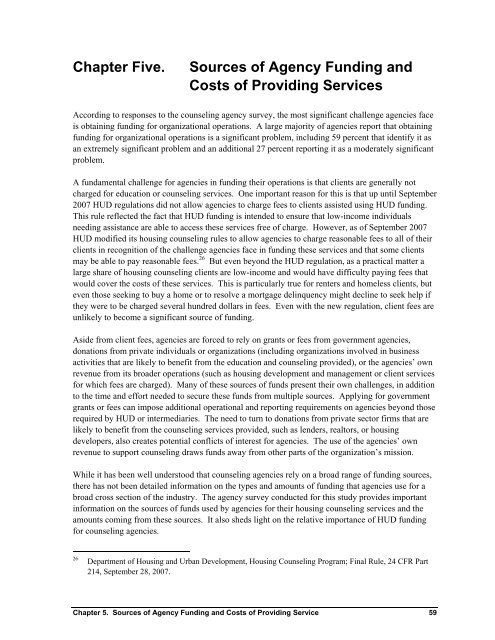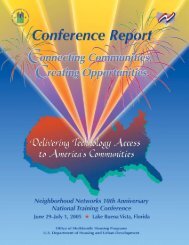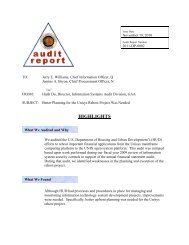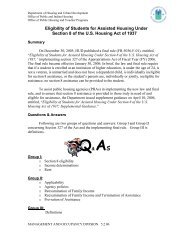Housing Counseling Process Evaluation and Design of ... - HUD User
Housing Counseling Process Evaluation and Design of ... - HUD User
Housing Counseling Process Evaluation and Design of ... - HUD User
Create successful ePaper yourself
Turn your PDF publications into a flip-book with our unique Google optimized e-Paper software.
Chapter Five.<br />
Sources <strong>of</strong> Agency Funding <strong>and</strong><br />
Costs <strong>of</strong> Providing Services<br />
According to responses to the counseling agency survey, the most significant challenge agencies face<br />
is obtaining funding for organizational operations. A large majority <strong>of</strong> agencies report that obtaining<br />
funding for organizational operations is a significant problem, including 59 percent that identify it as<br />
an extremely significant problem <strong>and</strong> an additional 27 percent reporting it as a moderately significant<br />
problem.<br />
A fundamental challenge for agencies in funding their operations is that clients are generally not<br />
charged for education or counseling services. One important reason for this is that up until September<br />
2007 <strong>HUD</strong> regulations did not allow agencies to charge fees to clients assisted using <strong>HUD</strong> funding.<br />
This rule reflected the fact that <strong>HUD</strong> funding is intended to ensure that low-income individuals<br />
needing assistance are able to access these services free <strong>of</strong> charge. However, as <strong>of</strong> September 2007<br />
<strong>HUD</strong> modified its housing counseling rules to allow agencies to charge reasonable fees to all <strong>of</strong> their<br />
clients in recognition <strong>of</strong> the challenge agencies face in funding these services <strong>and</strong> that some clients<br />
may be able to pay reasonable fees. 26 But even beyond the <strong>HUD</strong> regulation, as a practical matter a<br />
large share <strong>of</strong> housing counseling clients are low-income <strong>and</strong> would have difficulty paying fees that<br />
would cover the costs <strong>of</strong> these services. This is particularly true for renters <strong>and</strong> homeless clients, but<br />
even those seeking to buy a home or to resolve a mortgage delinquency might decline to seek help if<br />
they were to be charged several hundred dollars in fees. Even with the new regulation, client fees are<br />
unlikely to become a significant source <strong>of</strong> funding.<br />
Aside from client fees, agencies are forced to rely on grants or fees from government agencies,<br />
donations from private individuals or organizations (including organizations involved in business<br />
activities that are likely to benefit from the education <strong>and</strong> counseling provided), or the agencies’ own<br />
revenue from its broader operations (such as housing development <strong>and</strong> management or client services<br />
for which fees are charged). Many <strong>of</strong> these sources <strong>of</strong> funds present their own challenges, in addition<br />
to the time <strong>and</strong> effort needed to secure these funds from multiple sources. Applying for government<br />
grants or fees can impose additional operational <strong>and</strong> reporting requirements on agencies beyond those<br />
required by <strong>HUD</strong> or intermediaries. The need to turn to donations from private sector firms that are<br />
likely to benefit from the counseling services provided, such as lenders, realtors, or housing<br />
developers, also creates potential conflicts <strong>of</strong> interest for agencies. The use <strong>of</strong> the agencies’ own<br />
revenue to support counseling draws funds away from other parts <strong>of</strong> the organization’s mission.<br />
While it has been well understood that counseling agencies rely on a broad range <strong>of</strong> funding sources,<br />
there has not been detailed information on the types <strong>and</strong> amounts <strong>of</strong> funding that agencies use for a<br />
broad cross section <strong>of</strong> the industry. The agency survey conducted for this study provides important<br />
information on the sources <strong>of</strong> funds used by agencies for their housing counseling services <strong>and</strong> the<br />
amounts coming from these sources. It also sheds light on the relative importance <strong>of</strong> <strong>HUD</strong> funding<br />
for counseling agencies.<br />
26<br />
Department <strong>of</strong> <strong>Housing</strong> <strong>and</strong> Urban Development, <strong>Housing</strong> <strong>Counseling</strong> Program; Final Rule, 24 CFR Part<br />
214, September 28, 2007.<br />
Chapter 5. Sources <strong>of</strong> Agency Funding <strong>and</strong> Costs <strong>of</strong> Providing Service 59
















